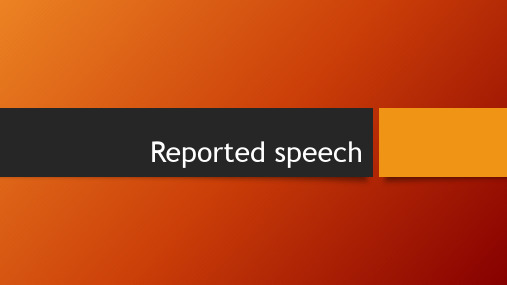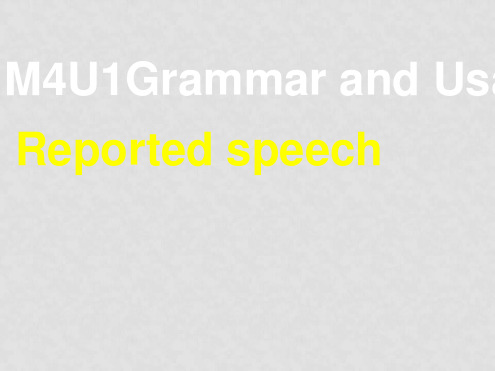高二英语reported-speech课件
direct speech and reported speech

• 一般疑问句,选择疑问句变间接引语时,要用陈 一般疑问句,选择疑问句变间接引语时, 述语气, / whether 。 述语气,并要加连词 if • She asked me:" Are you Mr. Li?" She asked me ______ ______ was if I _____Mr. Li. • She asked us:" Do you want to go on a picnic?" She asked us______ wanted go on a picnic. if we _______to Tom asked “ can I copy your homework?” Tom asked me _____ ______ ________ copy if he could ____: “ lucy is hard- working.” She said _________ was hard-working. Lucy _____
• Tom said : “ I’m watching TV.” • Tom said _____ _____ watching TV. he was • Mr Li said to me : “ Your listening is good.” my • She said to me _____ listeningwas good. ___ • Tim said : “ Mark is lazy.” • Tim said ________ _____ lazy. Mark was
The teacher said to us : “Light travels faster
than sound .”
The teacher said ________________________ light travels faster than sound.
【K12英语基础教育】reported-speech-grammar-drills-grammar-guides_110309

We informed her (that..)
She whispered (that..)
Change tenses ! Go backwards in time
Remember to change these
CAN WILL AM IS ARE HAVE HAS HAD WAS WERE
COULD WOULD WAS WERE HAD HAD BEEN
Direct speech "Where does Peter live?" "Where are you going?" "Why is she crying?"
Indirect speech She asked him where Peter lived. She asked where I was going. He asked why she was crying.
“I don’t know.” [direct speech] She doesn’t know if / whether she has enough time. [reported speech]
Whether or If
We can use if or whether before reported speech. Their meaning is the same:
"How do you know that?" she asked me. → She asked me ______________________
"Has Caron talked to Kevin?" my friend asked me. → My friend asked me __________________
高二英语reported-speech课件

Reported speech

Reported speech(间接引语)学案Step 1 Definitions(定义)直接引语就是_______________________________________________间接引语就是_______________________________________________Step 2 The choice of the connections (引导词的选择)圈出下列间接引语中的引导词。
1.The English teacher said that she liked English.2.The physics teacher asked us if/whether we could swim.3.The history teacher asked us what he was doing.4.The Chinese teacher asked/told us to stop talking.Rules:•当直接引语是陈述句时,用________引导。
•当直接引语是一般疑问句时,用___________________引导。
•当直接引语是特殊疑问句时,用___________________引导。
•当直接引语是祈使句时,用_____________________________的结构转述。
请写出下列间接引语的引导词。
1. He said," We're still students."2. "Where does your chemistry teacher live, Karen?"the young man asked.3. "Will you go to the concert with me this evening?" Mary asked me.4. The mother said,"Tom, get up early,please."Step 3 Word order(语序)用长方形画出引导词后的主语,用三角形画出谓语动词。
【K12英语基础教育】reported-speech-grammar-drills-grammar-guides_12624

PRACTISE
•Bima : “I go to Surabaya” •Tya : “What did he said?” •Dika : He said that……..
•HE SAID THAT HE WENT TO SURABAYA
•SHE SAID NOT TO SPEAK
PRACTISE
•Tya : “Don’t run!” •Bima : “What did she said?” •Dika : She said ……..
•SHE SAID NOT TO RUN
PRACTISE
•Tya : “Don’t look at me!” •Bima : “What did she said?” •Dika : She said ……..
•HE SAID THAT I TOOK MY BAG
PRACTISE
•Bima : “I sing a song” •Tya : “What did he said?” •Dika : He said that……..
•HE SAID THAT HE SANG A SONG
PRACTISE
•Bima : “I don’t take it” •Tya : “What did he said?” •Dika : He said that……..
•HE SAID THAT HE HADN’T COOKED A CAKE
PRACTISE
•Tya : “Open the door!” •Bima : “What did she said?” •Dika : She said ……..
•SHE SAID TO OPEN THE DOOR
湖南师范大学附属中学高中英语 Unit 1 Grammar2 Reported speech课件 新人教版必修41

enoun clauseisntroduced by WH-wordsto reportWH-questions.
The teacher asked Tom, ‘What's the m The teacher asked Towmhat wasthe matter.
Read Note 2, page 10
command
Read Note 3, page 10
‘Don't touch anything in the lab withou permission.' said the teacher. The teachetor ld us not to touacnhything in t lab without permission.
Imperative sentences. Use the structure: reporting verb + object + (not) to-infinitive to report imperative sentenceAss. k and telal re common reporting words.
4. 如果直接引语是一般疑问句,变为间接引语时用 whether/if引导,且用陈述句语序。 e.g. She asked meA,‘reyou the happiest
person in your family?' She asked mwe hether/ifI wasthe happiest person inmy family.
6. 转述祈使句时,我们使用该结构 : 转述动词(ask/ tell/ order/ advise/ remind/ warn/ insist/ suggest/ invite/ encourag…e ) +宾语+ (not) to do e.g. ‘Go and see a doctor after clas teacher said to me. My teachear dvisedmeto goand see a
Reported speech

引述主詞人稱要改時態往前推Say and tell時態往前推補充Direct speech Reported speech【課後練習】把以下句子改正:1. Tell the taxi driver where do you want to go.2. He asked me that what did I intend to do after I graduate?3. What does a patient tell a doctor it is confidential.4. What my friend and I did it was our secret. We didn't even tell our parents what did we do.5. The doctor asked that if I felt okay? I told him that I don't feel well.6. Is true you almost drowned? my friend asked me. Yes, I said. I'm really glad to be alive.7. It is a fact that I almost drowned makes me very careful about water safety whenever I go swimming.8. When I asked the taxi driver to drive faster he said I will drive faster if you pay me more. At that time I didn't care how much would it cost, so I told him to go as fast as he can.【答案】1. Tell the taxi driver where you want to go.2. He asked me what I intend ed to do after I graduat ed.3. What a patient tell s a doctor is confidential.4. What my friend and I did was our secret. We didn't even tell our parents what we had done.5. The doctor asked if I felt okay. I told him that I didn't feel well.6. "Is it true (that) you almost drowned?" my friend asked me. "Yes," I said. "I'm really glad to be alive."7. The fact that I almost drowned makes me very careful about water safety whenever I go swimming.8. When I asked the taxi driver to drive faster, he said, "I will drive faster if you pay me more." At that time I didn't car e how much it would cost, so I told him to go as fast as he could.(最後這題也可以改成indirect speech:When I asked the taxi driver to drive faster, he said he would drive faster if I paid him more. At that time I didn't care how much it would cost, so I told him to go as fast as he could.)。
Lecture 1 Reported Speech

Lecture One Reported SpeechI. Direct Speech ( DS) and Indirect Speech (IS)Direct Speech : direct quoting of one’s wordse.g. He said,” I am very angry.”“ Are you ready yet ? ” asked John .“ Be quiet!” I told him.Indirect Speech: indirect reporting of one’s idease.g. He said that he was very angry.John asked (me) whether I was ready yet.I told him to be quiet.II. Reporting clauses and reporting verbsA. Reporting Clauses are clauses that take a quoted sentence (DS)e.g. Dorothy said,’’ My mother’s on the phone.”Dorothy said that her mother was on the phone.“The exhibition finished last week,” explained Ann.Ann explained that the exhibition (had) finished the preceding week/ the week before.“My task today,”said the teacher, “will be to teach you how to use the SubjunctiveMood.The teacher said that his task that day was to teach us / the students how to use the Subjunctive Mood.***Attention to different positions and word orders of reporting clauses.B. Reporting verbs are verbs that express ways of speaking, such as say, ask, answer, order,promise, explain, complain, etc.e.g. “Sorry, I didn't recognize you,” she explained.She explained that she hadn’t recognized me and felt sorry for it.He ordered me angrily, “Keep standing where you are!”He angrily ordered me to keep standing where I was.“It’s so noisy!/,” she complained.She complained that it was too noisy.Ⅲ. Changes to be made when DS is changed into ISChanges in the following:A. Tense/aspect of the verbe.g. He said, “I feel sick today.”“I am not lying in bed any longer.”“I have had enough.”“I have been waiting for you over an hour.”He said (that) he felt sick that day.he was not lying in bed any longer.he had had enough.he had been waiting for me/her over an hour.“Shall I call the doctor for you, John ? ” I asked .I asked John if / whether or not I should call the doctor for him.“It may rain tomorrow,” he supposed.He supposed that it might rain the next day.*** NO change when 1) what is reported is a general truth or an objective fact; 2) the reported clause is in the subjunctive mood; 3) the reported clause contains a modal verb or a semi-auxiliary verb; 4) the direct speech has a predicate verb in the past perfective or past perfective progressive tense/aspect.e.g. 1)“Honesty is the best policy,” he said.He said that honesty is the best policy.“I get up at six every morning,” he told me.He told me that he gets up at six every morning.2)“I suggested that he (should) go there,” she said.She said that she suggested that he (should) go there.“I wished I knew what to do then,” he told me.He told me that he wished he knew what to do then.3)“You should work hard,” he said to me.He said that I should work hard.“You had better not say anything about this, ” he said.He warned me that I had better not say anything about that.4)He said, “I hadn’t seen her before then.”He said that he hadn’t seen her before then.She said, “I had been waiting for a long time before he came.”She said that she had been waiting for a long time before he came.B. Pronounse.g. I’ll behave myself,” he promised.He promised that he would behave himself.“This book is not mine,” he said.He said (that) that book was/ is not his.“This is your room, isn’t?” he asked.He asked me whether that was my room.*** No change when the reporter is reporting his own words or when the reporter and the reported are in the same situation/place.e.g. “This book is not mine,’ I said.I said this book is not mine.“This is the house where I was born,” he said.He said this is the house where he was born.C. Determinerse.g. “ I am your friend, Bob,” he said to me.He said to me that he was my friend.He said, “I want this one.”He said that he wanted that one.“These books are very expensive,” he said.He said that those books were/are very expensive.*** No change when the reporter and the reported are in the same situation/place.e.g. “What does this word mean?’ he asked.He asked what this word means/meant.“This is our house,” said my sister.My sister said that is/was our house.D. Adverbialse.g. today that daytonight that nightthis morning that morningyesterday the day before, the previous daylast night/week the night/week beforetomorrow the next afternoonnext week the next weeknow thenago beforehere theree.g. “They will arrive tomorrow,” he said.He said that they would arrive the next day.“I saw her three days ago,” said Tom.Tom said that he had seen her three days before.*** No change when the reporter and the reported are in the same situation/place.e.g. “Are the boys here?” he asked me.He asked me whether the boys were/are here.E. Verbs denoting directionse.g.. “Come and see what I’ve found,” he said to me.He asked me to go and see what he’d foundHe said, “I’ll bring my daughter with me.”He said he would take his daughter with him.Ⅳ.Special points for attention.A. How to turn Imperative Sentences from DS into ISe.g. “Come to join us this afternoon ,” he said to me.He told/asked me to go and / to join them that afternoon“Don't litter the garden,” he said to the people playing there.He told the people playing there not to litter the garden“Will you help me, please?” he said to me.He asked me to help him.“Could you lend me some money!” he said to me.He asked me to lend him some money.B. How to turn General Questions and Alternative Questions from DS into ISe.g. “Are you from Chengdu?” he asked me.He asked me if/whether or not I was from Chengdu.“Have you been to Beijing ?” he asked Ann .He asked Ann if she had been to Beijing.“Do you often go swimming in Summer?” she asked Victor.She asked Victor whether or not he often went swimming in Summer.”Should I do it right now?” he asked the teacher.He asked the teacher whether he should do it right then/right away.“Are you satisfied or not ? ” I asked.I asked him whether or not he was satisfied.“Shall I go by train or by plane?” he asked me.He asked me whether he should go by train or by plain.C. How to turn Special Questions from DS into ISe.g. “Who did it ?” they asked.They asked who had done it.Whose book is this?” he asked.He asked whose book that was.Which book do you like best?” he asked me .He asked me which book I like best.“What did you say?” she asked Peter.She asked Peter what he had said.“When did you start going to school?” she asked me.She asked me when I had started going to school.“Where are you from, Victoria?” he asked.He asked Victoria where she was from.Why are you so interested in English?” she asked me.She asked me why I was so interested in English.How have you done such a wonderful job?” Tom asked his sisterTom asked his sister how she had done such a wonderful job.D. How to turn Exclamatory Sentences from DS into IS. e.g. “What a lovely day it is today!” he said / exclaimedHe exclaimed/ remarked what a lovely day it was that day.He said that it was a lovely day indeed.“How hard you have worked!” he said to me.He exclaimed how hard I had worked.He said that I had worked very hard.E. Other Reporting Words than say, tell, ask,etc. for various meanings of the reported speech, such as advise, warn, promise, refuse, admit, confess, deny, insist, declare, exclaim, apologize, wonder, suggest, invite, request, beg, command/order, encourage, forbid, urge, greet, etc.)e.g. “We are all here now, sir!” the squad leader reported/said to the commander.The squad leader reported to the commander that all the soldiers were present then.“You’d better not drink too much wine,” she said to her husbandShe advised her husband not to drink too much wine.“Could you tell me what he said,” she said to me.She asked/requested me to tell her what he had said.“Let’s go right way, “she said.She suggested our going right away.She suggested (that) we (should) go right away.“Why not go and see her?” he said.He advised us to go and see her.He suggested our going to see her.He suggested that we go and see her.He said to the visitors, “How do you do !”He greeted the visitors.“All right, I’ll come ,” he said.He promised to come/go.He promised that he would come/go.“No, I won’t come,” he said/refused firmly.He refused to come/go.He said that he wouldn’t come/go.“It’s me who broke the window,” he said.He admitted breaking the window.He admitted/confessed that he had broken the window.“No, I’ve never done that,” he said.He denied having done that.He denied that he had done that.“Sorry, I’m late,” he said.He apologized/made an apology for being late.He apologized that he was late.“You must go with me,” he said to me.He insisted on my going with him.He insisted that I (should) go with him.The jury declared, “He is guilty!”The jury declared him to be guilty.The jury declared that he was guilty.“Can I help you, Sir?” he said to the guest. He offered to help the guest.“What a lovely house!” he exclaimed.He exclaimed that it was a lovely house.。
- 1、下载文档前请自行甄别文档内容的完整性,平台不提供额外的编辑、内容补充、找答案等附加服务。
- 2、"仅部分预览"的文档,不可在线预览部分如存在完整性等问题,可反馈申请退款(可完整预览的文档不适用该条件!)。
- 3、如文档侵犯您的权益,请联系客服反馈,我们会尽快为您处理(人工客服工作时间:9:00-18:30)。
